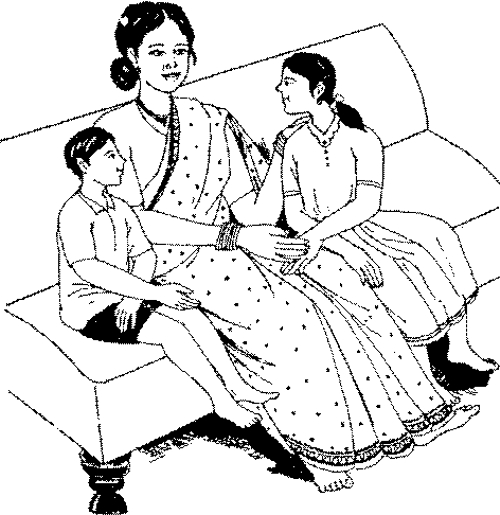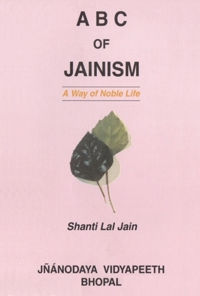LESSON 9
Jaina Religious Practices

Daughter | Ma, what are the Jaina religious practices? |
Mother | Jaina religious practices are Deva-Pūjā (Worship of Jina), ouru-upastl (proximity or nearness with the monks) Śāstra-Svādhyāya (study of scriptures), Sanyam (practice of self control), Tapa (penance) and Dāna (Charity). We Jainas should practice these six essentials daily. These are essentially performed by the Jainas, so these are known as "Essentials". |
Daughter | Ma, my friends ask that if the true practice of Ahimsa and Satya lies in living our daily lives, then why go to temple and why pray and worship? |
Mother | Oh my child, our idols of Tīrthankaras in the temples remind us of the nature of Reality. They inspire us to make spiritual progress. During worship, we are happy and relaxed, we enjoy peace of mind. |
Son | What is Deva-Pūjā and how can we do it? |
Mother | Worship or prayer of supreme souls is Deva-Pūjā, Supreme souls are Arihantas and Siddhas. Jainas worship or pray before the idols of Tīrthankaras (the supreme souls). The procedure of prayer or worship (Pūjā-vidhi) has been outlined in religious books. While we are doing pūjā, we remember the virtues of Supreme Souls. We recite their virtues and we bow down before their idols with deep devotion. During the pūjā, we should have good thoughts and feelings. |
Daughter | What do we mean by Guru-Upāsti? |
Mother | All those monks who practice the teachings of Jaina religion are spiritual Gurus. We Jainas should achieve proximity or nearness with the Guru and always feel their presence in our lives with respect. This is called Guru-Upasti. Our spiritual Gurus have control over their passions and preach the teachings of religion through practices. Thus, Gurus are spiritually ahead of the house-holders. |
Daughter | Ma, What do we mean by Śāstra-Svādhyāya? |
Mother | The study of scriptures preached by "Jina" is Śāstra- Svādhyāya. We Jainas should study the scriptures and religious books daily. Its purpose is to enrich the knowledge of the right path; to practice sympathy and compassion to all; and to refine our moral and spiritual efforts. Svādhyāya is also helpful for educating our youngsters, friends and others. |
Son | Ma, How can a house-holder practice self-control? |
Mother | Self control means not having bad thoughts, anger, greed, jealousy.or hatred. So, we Jainas should practice self control on our thoughts and activities as far as possible. Wantlessness should be our goal of life. We should minimize our desires and passions and regulate our daily necessities which would save us from exploitations and committing crimes. We should control our diet and other worldly pleasures. Self control gives us self-satisfaction and inner fulfillment. |
Daughter | What do we mean by Tapa? |
Mother | Tapa or penance is a control on desires. It disintegrates our karmas of bad deeds and induces us to dissociate from bad habits. Penance gives us self-confidence and develops our will-power to do good. So, we Jainas should perform some penance every day. Penance can be external like fasting (Upavāsa) and internal like reverence (Vinaya), meditation etc. |
Daughter | What is charity in Jainism? |
Mother | All religions highly praise the virtue of the charity or donation. Every body agrees that helping others in cash or kind is admirable. In Jainism, charity or donation is Dana, which means giving one's wealth for mutual benefits. So, it!;':; donation to poor and needy persons should be with compassion and to the monks with reverence. A donor should not have any desire for material gains from the donations and should draw joy in giving. Actually, charity is self-sacrifice. In Jainism charity is of four kinds - donation of food (Āhāra-dāna); donation of medicine (Ausadha-dāna). donation of books or education (Jñāna-dāna) and giving protection or freedom from fear (Abhaya-dāna or Āvāsa-dāna). My Child, by proper practice of six essentials, we improve our faith and knowledge. It makes us a better individual. It helps us to love all and serve all. |
 Shanti Lal Jain
Shanti Lal Jain
